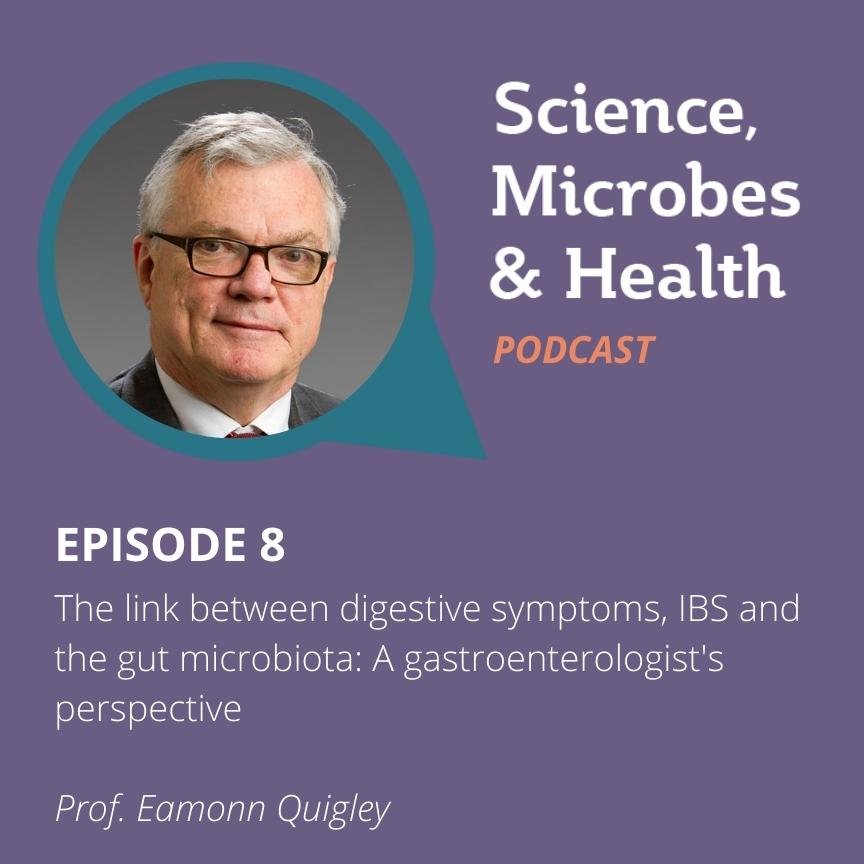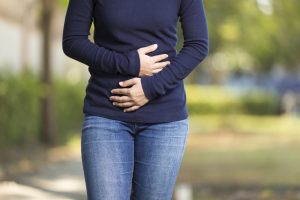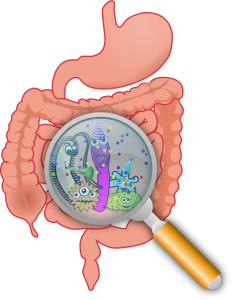Episode 8: The link between digestive symptoms, IBS and the gut microbiota: A gastroenterologist’s perspective

Listen to the Podcast:
Podcast: Play in new window | Download
Subscribe: Apple Podcasts | Spotify | RSS
The Science, Microbes & Health Podcast
This podcast covers emerging topics and challenges in the science of probiotics, prebiotics, synbiotics, postbiotics and fermented foods. This is the podcast of The International Scientific Association for Probiotics and Prebiotic (ISAPP), a nonprofit scientific organization dedicated to advancing the science of these fields.
The link between digestive symptoms, IBS and the gut microbiota: A gastroenterologist’s perspective, with Prof. Eamonn Quigley
Episode summary:
In this episode, the ISAPP hosts focus their discussion around irritable bowel syndrome (IBS) with Prof. Eamonn Quigley, MD, of Weill Cornell Medical College. Prof. Quigley says patients are increasingly curious about the link between IBS and gut microbiota. He outlines what we know so far about the etiology of IBS, and the evidence for how gut microbiota may contribute to the condition as well as possible interventions that target the gut microbes.
Key topics from this episode:
- What are the symptoms of IBS?
The typical symptoms is abdominal pain associated with a disturbance in bowel function which could be diarrhea or constipation, or even alternating between them, depending on the patient. - How prevalent is IBS?
Estimates say 5-10% of all people globally have IBS. - What is the etiology of IBS?
There is no clear cause for IBS identified to date. IBS has been linked to the gut-brain axis (as it often co-occurs with depression and anxiety), gut microbiota, diet, previous gastrointestinal infections (Salmonella, Shigella, Campylobacter infections), and antibiotic use. It is also more common in women. - How is IBS treated?
Approaches have tended to focus on treatment of symptoms: for example, treating the pain or diarrhea. Diet has also become an essential part of IBS treatment. But overall quality of life for IBS patients is of crucial importance. The focus should not be only on treating symptoms but also on improving their quality of life. - Are probiotics effective for IBS? A short history and perspective on how to develop probiotics for IBS.
- Effects of the COVID-19 pandemic and COVID-19 infections in IBS patients – lessons learned from other viral infections.
- Is the gut microbiota the “Holy Grail” for gastrointestinal health? We still have a lot to learn, especially regarding clinical applications.
Episode abbreviations and links:
FODMAP: fermentable oligosaccharides, disaccharides, monosaccharides and polyols (i.e. types of carbohydrates that are poorly absorbed in the small intestine).
EMA: European Medicines Agency (i.e. the European counterpart of the US Food and Drug Administration)
CME course on digestion and gut microbiota: Android version, iOS version, web version
Additional resources:
I have IBS – should I have my microbiome tested? ISAPP blog
The Microbiome — Can it aid in the diagnosis and therapy of irritable bowel syndrome (IBS)? ISAPP blog
About Prof. Eamonn Quigley:
Eamonn M M Quigley MD FRCP FACP MACG FRCPI MWGO is David M Underwood Chair of Medicine in Digestive Disorders and Chief of the Division of Gastroenterology and Hepatology at Houston Methodist Hospital. A native of Cork, Ireland, he graduated in medicine from University College Cork. He trained in internal medicine in Glasgow, completed a two-year research fellowship at the Mayo Clinic and training in gastroenterology in Manchester, UK. He joined the University of Nebraska Medical Center in 1986 where he rose to become Chief of Gastroenterology and Hepatology. Returning to Cork in 1998 he served as Dean of the Medical School and a PI at the Alimentary Pharmabiotic Center. He served as president of the American College of Gastroenterology and the WGO and as editor-in-chief of the American Journal of Gastroenterology.
Interests include IBS, gastrointestinal motility and the role of gut microbiota in health and disease. He has authored over 1000 publications and has received awards and honorary titles world-wide. Married for over 40 years to Dr Una O’Sullivan they have 4 children and three grandchildren. Interests outside of medicine include literature, music and sport and rugby, in particular; Dr Quigley remains a passionate supporter of Munster and Irish rugby.



